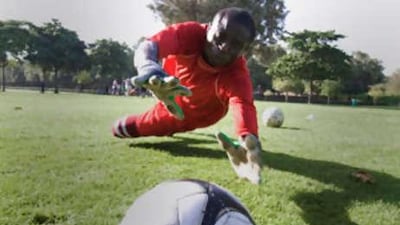DUBAIi // As the sun fades, a squad of African footballers finish a three-hour evening training session and head to the washrooms to change. They are around 20-strong most evenings. All say they are in their early 20s, and most have played football for decent league sides in their home countries of Cameroon, Nigeria and Guinea-Bissau.
The men left their homes for the UAE in search of professional contracts and better wages to support their families, some paying thousands of dollars to unlicensed agents and managers in their home countries who promised trials with top league sides here. When they arrived, however, the football landscape was very different to the picture painted by agents and even extended family members, a situation replicated in many footballing nations in Europe and Asia to which unscrupulous agents have lured African players.
"Before I came, I thought it [obtaining a contract for a club] would be as [it is in] Europe," said George, a goalkeeper from Guinea-Bissau who came to the UAE three years ago and, along with the other players interviewed, would not give his surname. "When your manager takes you to a club after trials, they see you are good and they would do the normal signing." However, regulations are such that only four foreign professionals can play for a UAE club, one of whom must be from Asia. Most foreign signings tend to be experienced senior internationals, meaning competition is fierce. Fabio Cannavaro, the captain of Italy, recently left the Serie A side Juventus for Dubai-based Al Ahli.
The limit on foreign players is making life harder on players such as Louis, who arrived in Dubai six months ago. Having paid a manager at home US$3,000 (Dh11,000) to find him a team, he has relied on the support of his family in Africa and Dubai's expanding African expatriate community to get by. He had been playing for Jasper United, a former top-flight team in Nigeria, but the salary was small and, like millions of young men, he dreamt of a career in Europe. With visas for European nations difficult to obtain, the UAE appeared from afar to be the perfect gateway.
"My manager brought me here to find a club," he said. "Later, when that did not happen, he left and went to another country. I don't know which country because when I call he does not answer." Roland, a 22-year-old defender from Cameroon, also left behind a good football career with teams in his home country in search of better wages to support his family while playing the sport he loves. He also paid someone "at least $3,000" to move to Dubai, he said.
"I'm not sure if he was an agent," he said. "Sometimes he takes care of footballers. He was African. He watched me play and approached me. He told me to go and meet this guy, but nothing came of it." Roland, Louis and about 18 others found their way to the same local park where they now train five times a week under the guidance of a respected Nigerian player. Many play for amateur expatriate teams in various emirates, and a couple for more established sides, which, they say, has helped them to obtain the correct paperwork.
"Dubai is good if you have good people around you who look out for you, but without them it is expensive and a struggle," Louis said. loatway@thenational.ae

